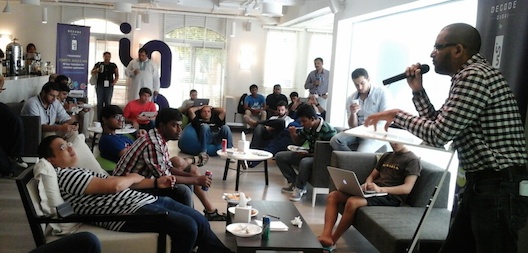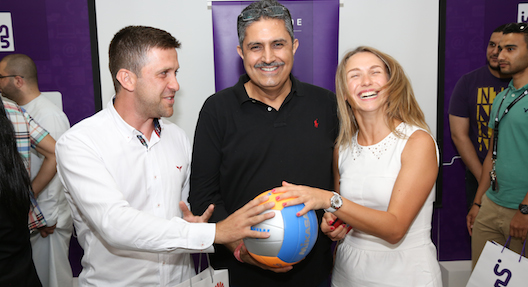Urban mobility, energy and emissions - Decode Dubai tackles big city problems


Teams listening to a speaker midway through the
conference. (Images via Dubai Internet City)
As Dubai passionately pursues its strategy to become a smart city by the turn of the decade, Dubai Internet City recently hosted eager startups at the second edition of Decode Dubai: a 48-hour hackathon to inspire local tech aficionados to create novel smart solutions that help to elevate Dubai’s smart city status.
Nearly 200 competitors - a mix of technopreneurs, coders, hackers, developers and designers - were in attendance at opening night, reflecting the city’s small yet thriving tech community.
There were also non-UAE techies as well. Irina Sushko and Neven Solidov - software developers from Bulgaria - decided to compete on a whim. Sushko blogs about her travel experiences, occasionally undertaking software development work to pay for her expenses: “I’ve travelled extensively and what so many adventurers seek, especially those in the millennial generation, is a more local, authentic experience. I figured joining the competition would be a good way to push myself to produce an app in two days.”

Majed Al Suwaidi with the EnergiCity
team.
While some participants already had a team and idea, others had to pitch their ideas in the hope of finding collaborators. The majority of the 25 pitches fell into the 'shopping and retail' category. Ideas included a collaborative community wall, an intuitive dining recommendation app, a job site for physically challenged individuals and door to door auto services.
At the finale the teams presented, in a closed session, to a panel of over a dozen judges drawn from across Dubai’s government, private and startup sectors which included Marwan Salem Bin Haidar, executive director of Planning & Development for Dubai Smart Government and Majed Al Suwaidi, managing director of Dubai Internet City and Dubai Outsource Zone.
One of the judges, Ashish Sidra, VP for Innovation at telecom operator du, was impressed by the calibre of competitors.“Not only did the teams conjure innovative ideas, they were also able to apply their enthusiasm and expertise towards creating early prototypes within such a short timeframe,” he said.
The five winning teams will be paired with mentors and will spend the next three months sharpening their apps for the Dubai finals in September 2015, with one idea elected to represent Dubai at the global Smart City App Hack finale in Barcelona.
- Collaborative City: KarmaConomy.
The founders of this social impact-oriented app - Mesood Sofi, Ewan
Drego and Michael Haigney - plan to incentivize positive community
building behavior among the city’s residents.
- Culture and Tourism: beThere. Sushko and Solidov impressed the judges
with their demo of a travel app that allows users to “feel like an
insider anywhere in the world”, enabling visitors to connect with
locals and access recommended itineraries. In return, locals
receive points and potentially cash.
- Energy and Emission: EnergiCity. From undergraduate students Dev Dua,
Dinesh Balani, Mihir Rai, Mohammed Muzammil and Vijit Katta, the
mobile app gamifies energy conservation, incentivizing consumers to
save power by rewarding them with points. “Energy conservation is
the need of the hour and it needs to be more user-friendly. We plan
to incorporate automatic reminders to switch off the lights once
the user leaves his/her home and enable remote control of the
electrical devices through the app,” Balani said.
- Shopping and Retail: Daleelio.
Anas Almarie, Hamza Alazzeh and Mohammed Allababidi joined forces
to construct a winning algorithm to allow for
hardware-free indoor and outdoor navigation. Daleelio has already
secured interest from locally-based clients and is seeking seed
funding to develop a prototype in Canada.
- Urban Mobility: Connected Cars. The brainchild of dashroad cofounders, Dr. Zawar Qayyum and Faheem Gill, this connected car technology involves a simple chipset - including a built-in GSM/GPRS, a GPS receiver and an accelerometer - that can be installed even in older vehicles. “Connected Cars will leverage big data to enable a more in-depth valuation of used cars, beyond just mileage and exterior appearance. Most importantly, in the event of an accident, the accelerometer will immediately notify your emergency contacts and the police, depending on the severity of the collision,” said Gill, a former engineer with Toyota and Honda in the US. Currently incubated at in5, the team is working with a “tier 1 auto supplier” in the US to produce the devices and inviting beta testers to sign up.

The beThere cofounders with Prashant Gulati of The Assembly.
Several competitors conjectured that the city’s relatively new, young hackathon culture can attract more participants and raise the bar for creativity and innovation, by offering more substantive rewards for winners.
Sidra believes industry hackathons offer a valuable opportunity for corporations to feel the pulse of innovation in the community and can be mutually advantageous for both entrepreneurs and big businesses.
“From du’s perspective, our biggest contribution is using our customer reach and market positioning to support relevant startup ideas to go to market. This philosophy allows young and innovative businesses to gain instant and substantial recognition with which they can establish their customer base.”
His words may bear heeding by the key players in the local corporate and entrepreneurial ecosystems to join forces and radically energize and democratize the infrastructure for budding innovators, thus enabling the city to flourish as a hotbed for tech talent.

